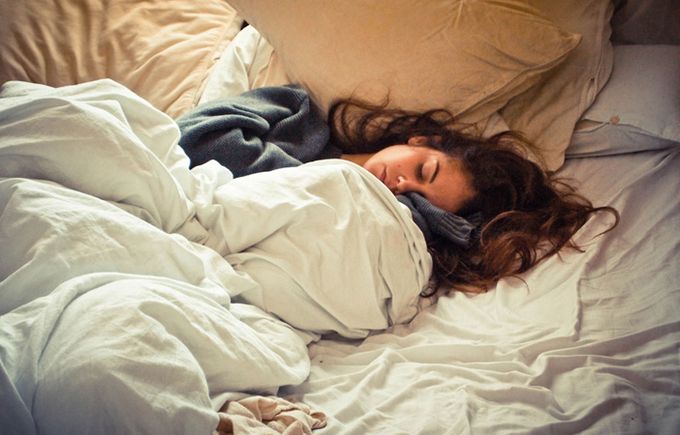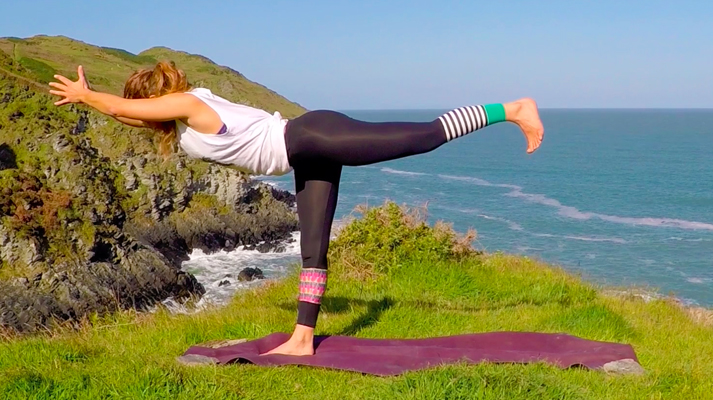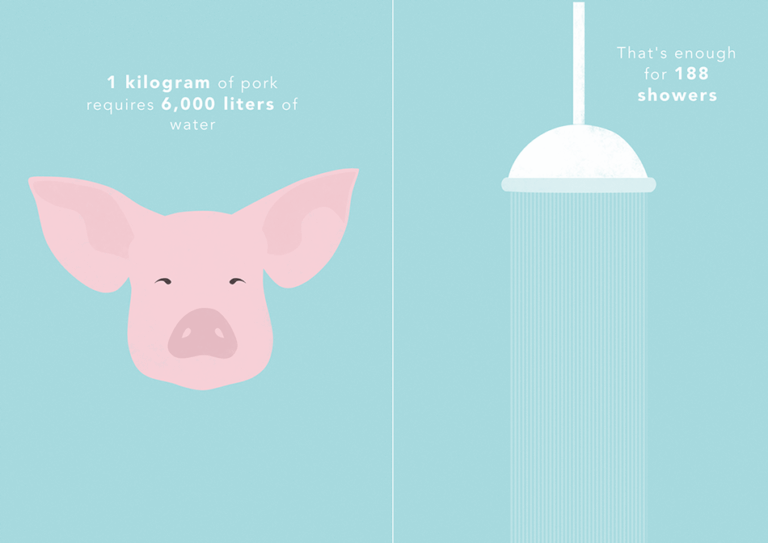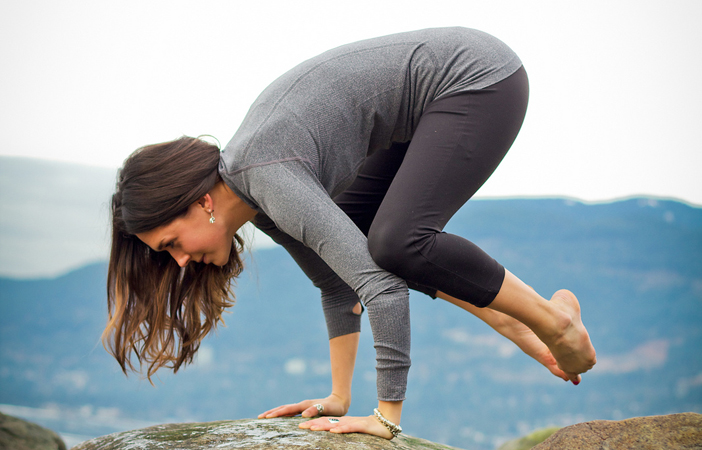
Everyone will experience anxiety at some point in their life. Whether it’s anticipating a job interview or worrying about a medical check up, we’ve all been there.
But for some people, anxiety is a lot more than that. It’s an ongoing problem that affects their everyday lives.
When I started researching this piece, I put a message out on Twitter and my own Facebook page, asking for comments from healthy active women who suffer from anxiety. The response was overwhelming.
It’s like being sucked into the vortex of a storm. It’s impossible to think about anything else…
Within minutes, my inbox was pinging with a dozen messages from close friends to strangers, all wanting to discuss anxiety.
All of these women are active, healthy, seemingly happy people who love the outdoors. They surf, ski, run, cycle, climb mountains and practice yoga – but internally they struggle with something much more difficult.
It’s know as generalised anxiety disorder (GAD) – and it’s much more common than you might think. One in 25 people in the UK suffer from GAD, according to the NHS. That’s over 2 million Brits.

What I found more surprising was how many of the women I spoke to keep their anxiety problems a secret – even from their closest friends and family.
So what makes people anxious? One thing that’s very clear: it goes well beyond the occasional worry that crops up in everyday life.
What is anxiety?
“It’s all-consuming. It’s like being sucked into the vortex of a storm” says Carole, 56 from France. “It’s impossible to think about anything else. I don’t do a lot of things because of anxiety. Sometimes I freeze up and just can’t even do the simplest of tasks.”
I Grew Up Thinking Sport Wasn’t For Girls. Now I’m Running A Marathon
Anxiety disorder sufferers don’t just feel anxious about one thing. It’s different for every person – but often it consists of a multitude of worries that cannot be controlled and arises in times of high stress.
“I worry about dying, the future, if I said something wrong, whether I’ll find a parking space and everything in between,” says Sally, 34 from Newcastle.
She is a professional dancer who loves hiking, climbing, snowboarding and skydiving. She doesn’t worry about jumping out of a plane, it’s everyday concerns that make life difficult for her.

“I’m constantly exhausted from worrying about every little detail, particularly germs. Sitting on a train near someone with a cold freaks me out more than jumping out of a plane.”
It doesn’t even have be a rational, tangible fear. “When I wake up, I will have a sinking feeling in my stomach – like something is wrong, even though it should just be a normal day,” says Anna, 35 from Sheffield.
“Sitting on a train near someone with a cold freaks me out more than jumping out of a plane…
“I find it hard to concentrate, I don’t want to talk to anyone or socialise. I just want to stay at home and be cosy.”
For others, it’s about not feeling in control of yourself or the future. “I get nervous of relying on other people,” says Katie, 24 from Bristol. “I like to feel in control – whether it’s waiting for an email response or organising holidays. I don’t like not being able to resolve a situation myself.”
Body image cropped up time and again.”There is so much pressure on young women nowadays – to be successful in their career, to be healthy and fit and look like a supermodel all at the same time,” says Sara, 24 from London.

Plenty of women also cited meeting new people as sparking chronic anxiety. “I’m anxious all the time if I’m not on my own,” says Zara, 29 from Sheffield. “It’s not because I’m shy – I’m definitely not – just interacting with people flares up this response on my brain. I can’t help it.”
It’s clear that anxiety doesn’t just take one form, but what can you do if it you suffer from anxiety?
Severe Anxiety Is A Medical Condition
“Severe anxiety is a medical condition in the same way high blood pressure or asthma are medical conditions,” says Dr Ian Drever, a consultant psychiatrist at the Priory Hospital in Woking.
“It’s not a sign of weakness, as many people think, and can actually be a sign of strength. Often people with anxiety tend to ‘soldier on’ for months or even years before seeking treatment.”
Many of the women I spoke to kept it a secret from their closest friends and family. Others worried about it affecting their employability or that colleagues wouldn’t take them seriously – which ultimately stops them from going to a doctor to seek help.
“One attitude that is really unhelpful that I hear all the time is ‘You’re a clever/pretty/healthy/lucky girl, what do you have to worry about?” All this does is make me feel guilty on top of everything else,” says Sally.
So what can women like Sally do? “Psychological therapy and medicines can significantly reduce the anxiety response to manageable or ‘normal’ levels,” says Dr Alex Fowke, a clinical psychologist.
No one is quite sure what the exact causes of generalised anxiety disorder are, but two paths are often recommended by doctors: cognitive behavioural therapy or anti-depressants.
Anxiety is not a sign of weakness. It can actually be a sign of strength. People tend to ‘soldier on’ for years before seeking treatment
However, every single person I spoke to was against taking medication. Holly, 25 from London, believes doctors are too quick to hand out medication straight away. “There are more natural ways of dealing with anxiety – and I feel like doctors need to be more clued up on this.”
Sara agrees. “I don’t think people should be directed to drugs and doctors straight away. There are ways to help yourself, from eating the right food to getting good sleep and identifying what causes anxiety and managing that.”
But for Anna, seeing a cognitive behavioural therapist – which is free on the NHS – about how to recognise and deal with anxiety was really helpful.

What are the best coping methods?
If you don’t want to take medication and you’re already seeing a therapist, what are your options?
It’s different for every person, but the majority of people said that exercising and connecting with nature was crucial to keeping anxious thoughts at bay.
We asked a handful of sufferers what natural methods helped them. These obviously won’t work for everyone, but might be useful if you suffer from severe anxiety.
- “I avoid drugs (including high doses of caffeine), any more than one or two alcoholic drinks and get plenty sleep. If I don’t, the next few days are guaranteed to be horrendous” – Sally
- “I think an important coping mechanism is realising that it’s absolutely fine not to be perfect, and not add to the situation by beating yourself up” – Zara
“Kids Shouldn’t Be Practicing Extreme Sports”. What Do You Think?
- “Having a sounding board works for me. It helps if I can tell my worries to someone. By saying it out loud, I helps me realise how irrational they are” – Katie
- “I recommend removing quick release sugar foods, caffeine and reducing carbohydrates in general. Exercise most days and especially before a time when anxiety would be particularly prevalent” – Chris
- “Get a good night’s sleep. The power of sleep is so, so underrated. Some days I knew I just need to relax and not put too much pressure on myself – even if I have 1,000 things on my To Do list” – Sara

Almost everyone I spoke to agreed that anxiety is definitely something that needs to be discussed more openly.
“People need to know it is acceptable to feel like you can’t cope sometimes and that there are ways to help,” says Sara. “It’s very hard because it’s not the same as a physical injury with an obvious cut or bruise. So it’s sometimes hard to explain to someone why you feel that way.”
But many women don’t want to be labelled as someone who sufferers from anxiety. As Anna says, “It’s just how I am, and I have friends that accept me as I am.”
The stigma is definitely shifting. More magazines and newspaper are speaking frankly about mental health problems, but it’s still hard for many to open up.
For Sally, speaking to others marked a turning point. “Things are definitely easier since I told those closest to me the truth. I just need understanding that I’m not doing it on purpose or making it up.
“The more people talk about it and the sooner we remove the embarrassment stigma, the more people will seek help.”
If you suffer from severe anxiety, Anxiety UK are here to help. Visit their website or ring their helpline on: 08444 775 774.




